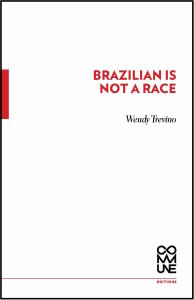 That's what draws me to poetry and the lyric essay. That's what drew me to Poet Maggie Nelson's Bluets. Where a lot of people considered that a lyric essay I've always considered it a collection of anecdotes/prose pieces about things she associates with the color blue.
That's what draws me to poetry and the lyric essay. That's what drew me to Poet Maggie Nelson's Bluets. Where a lot of people considered that a lyric essay I've always considered it a collection of anecdotes/prose pieces about things she associates with the color blue."Form is a trial and error thing for me. It doesn’t typically come first (unless it does). I often want to write about something, or find myself writing about something, and then have to try out the material in various ways, until the form feels right, takes off." (Nelson, "Interview w Maggie Nelson, Atlas Review)
Ever since I figured out that research was a big part of the writing process of San Francisco Poet Amy Berkowtz's lyric essay Tender Points, I've been wanting to say that the bibliography is a defining characteristic, but then that feels problematic. If you go to the back of something like Nelson's Bluets, or her latest, Argonauts, there aren't any bibliographies, while there are in some works that were explicitly written as poetry collections, like San Francisco Poet Wendy Trevino's most recent chapbook Brazilian Is Not A Race.
Recently I interviewed Trevino and she said, "BRAZILIAN IS NOT A RACE is about the history of race relations, anti- blackness, radicalism & Anarchism in the Rio Grande Valley of South Texas, which is also the U.S.-Mexico border."
By definition form came first for Trevino when she decided to write the entire thing in sonnets, but then it's also about the history of race relations, and that takes a lot of research to talk about. Before I sat down to write this I asked her if she would strictly categorize it under poetry, and she said, "no, I'd like to think of it as an essay too." But it really goes to show me it doesn't matter.
Trevino's currently working on another set of sonnets that focuses on feminism and her engagement in feminist circles, with women, queer and transmen, and women. From what she told me it seems like this is requiring the same process of research that it took to write BINAR.
"If people are mad now because I didn’t obscure the argument that sparked BRAZILIAN, even though I never mentioned the names of people involved in the argument, I can only imagine how they feel when I actually name people, which I do in this series, and I make an argument for naming," says Trevino. "I will likely keep all that, but I’m thinking I should probably do more reading for the sonnets because so far I’ve mostly been thinking through my experiences in feminist circles & not writing about feminism really."
Like everything else I've talked about up unto this point the process of writing this is turning out to be very much like a compilation of research and memory work.
Now rewind, what did I say to myself after what I said about Nelson's Bluets? I said, "that's trying too hard to write about the lyric essay." Not only that but it's trying too hard to write a lyric essay about the lyric essay.
This might be a good beginning to something on the lyric essay/even a conclusion. But then again thinking about that even, is trying too hard to write about the lyric essay. Before I even figured out what the lyric essay was I thought it was poetry.
Then after I figured out what it was I thought research was the most integral part of that writing process. Now that I've talked to Trevino I know research is an integral part of any writing process if you want to talk, or write about anything with credibility.
It's almost exactly like Haruki Murukami's What I Talk About When I Talk About Running. That's considered a piece of memoir/creative nonfiction and all he had to do to write it was research the subject of running and talk about it.
Murakami probably had no idea what that was going to be either
I think a number of writers have said "Write about what you know".
ReplyDeleteI feel that when a writer does research, into an area they know, it tends to feel that way.
Sometimes I wonder though if a writer simply researches the subject completely subjectively (i.e. without any previous opinion) if the writing comes across as honest or as simply studied (i.e. sort of dry).
Like, there are writers who are famous for a particular type of research (like biographers of presidents, etc.) who, if they were to turn away from what they really enjoyed/loved, would they still give it the same level of effort and would it be as good?